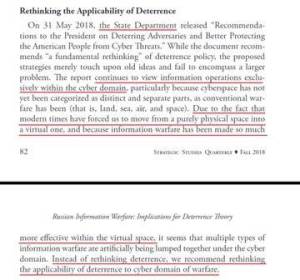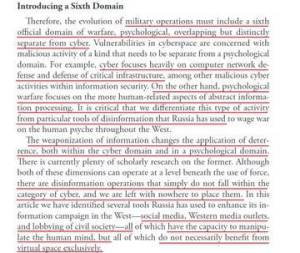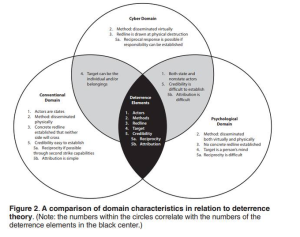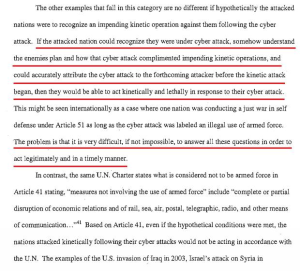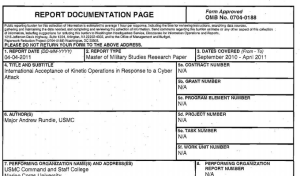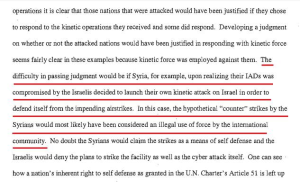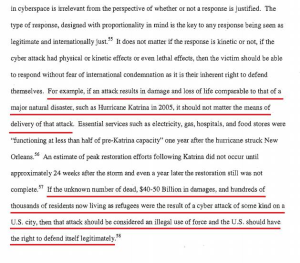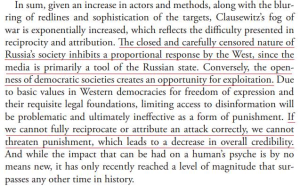So, on Agir & Vailliant's account, the correct way to think about NAFO might not really be a form of cyber war, though it'd heavily overlap. Rather, NAFO is a form of (defensive) psychological war in a digital disinformation context.
It gets into funky diagrams real quick but insofar as "activism" goes, I'd argue outside of a few specialized groups of fellas, most of NAFO firmly inhabits the lower right of this diagram So that's gotta be treated distinctly from cyber, and with the same if not more weight
Agir & Vailliant cut off right there; but, Media Ajir & Bethany Vailliant were teachers & researchers for University of Nebraska–Omaha, Bellevue University and National Strategic Research Institute (NSRI) at the time, so... https://jstor.org/stable/26481910?seq=19
The larger problem ends up being, still: what constitutes proportionate retaliation for a large-scale information war attack by a nation-state? What even is deterrence in that context? It is important to note this is an *ongoing* attack https://apnews.com/article/russia-election-trump-immigration-disinformation-tiktok-youtube-ce518c6cd101048f896025179ef19997

So one standard for cyber-war attack is, essentially, does it actually kill people. This is actually a question someone appears to have asked and answered, the title is, yes: "International acceptance of kinetic operations in response to a cyber attack" https://apps.dtic.mil/sti/citations/ADA600813
Rundle argues, suppose Israel hacks Syria's air defenses - independently or preparatory to air strikes, and Syria realizes this and attacks Israel to pre-empt air strikes. On his account, this would be probably be considered illegal.
The broader problem remains, as Rundle points out, it's really hard to figure out what's going on and whether or not a cyber attack fits into something else; that fog of war might actually be accentuated by disinfo as part of the attack (as happened in Ukraine).
If, however, there was a cyber-attack that resulted in loss of life comparable to, say, Hurricane Katrina... Then whether or not that's someone bombing America or hacking it, that would be an illegal use of force with a commensurate right of defense. Basically, it'd be on.
So this is where the Ukraine war, as context of the ongoing Russian information war on America, turns real interesting. You could argue, up until February 24, 2022, there wasn't really anyone really directly dying because of the information war on America, but that changed.
As Anderson argues in Forbes three weeks ago, Mike Johnson's clear intent all this time has been to stop (or, I'd argue, delay) Ukraine aid. Immigration bills that won't pass are just a way to delay it. https://forbes.com/sites/stuartanderson/2024/02/15/johnson-intended-to-stop-ukraine-aid-not-pass-an-immigration-bill/?sh=62a7e2fa6e86

The end result of Russian disinformation that Republicans cite to justify their opposition to Ukraine aid is delayed aid and concrete, tangible, traceable harm to Ukrainians. https://nytimes.com/2024/02/17/us/politics/biden-congress-avdiivka.html

Essentially, the threshold for "bombing people because they said a thing we don't like" is, does it actually kill people. And now that there are people dead, in Ukraine, because of Russia's information war on America, that approaches the level of justifying kinetic response.
...oh and to finish the thought, not only is NAFO highly proportionate, in the context of fighting against a nation-state sponsored information-war machine targeting Americans that is, again, killing actual people I'd argue, it's actually a better form of response than kinetics
the big reasons being, look: I don't need government-level levels of surety to operate on general principles; like most regular citizens out here I have to operate in a state of near-perpetual ambiguity And I have zero legal or ethical issues with operating in domestic politics
Absent large-scale citizen offensive information-war & counter-influence efforts - really, just more of the same as far as what NAFO does, except larger-scale - I don't think there's much sane deterrence possible in information war It's really a lot better than bombing people






